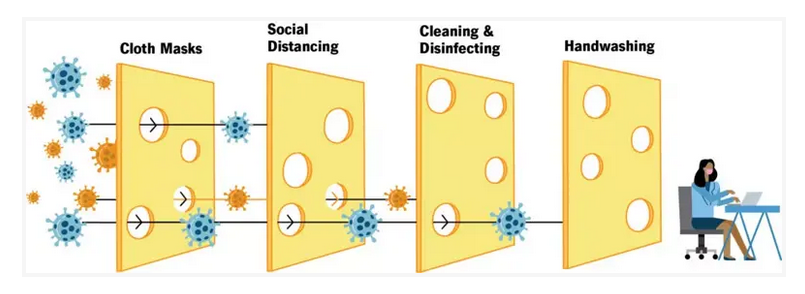Long Term Sterility
You should do as much as possible to ensure your vials are sterile during your brew process. But how can you ensure that they stay sterile once you’re no longer brewing and/or they’re no longer in your hands?
I’d like to present the swiss cheese diagram that became popular during early covid.

This diagram was used to illustrate how a single strategy was not adequate to stop the spread of the pandemic. You can see how each layer of swiss cheese blocks some of the virus particles, but not all of it. According to the diagram, cloth masks helped reduce the spread partially, but we also needed to rely on social distancing, then cleaning/disinfecting, then finally hand washing. If you’re lucky and none of the holes line up then you’ll stop the spread of covid.
While a more modern version of this diagram might have some key updates, my point stands. Sterility does not come from one single place. Sterility comes from lining up all the pieces just right.
One of these pieces, then, is maintaining sterility after a vial is punctured. How can the homebrewer be involved in that process?
Controlling Long Term Sterility by Controlling Vial Size and Concentration
The current norm in the homebrew scene is to make 10mL vials of estradiol at a 40mg/mL concentration. If someone is using an average dose of 5mg, and assuming no loss to dead space, that vial will last someone 80 doses. That’s around 18 months or 560 days.
The United States Pharmacopeia (USP) is handbook published by a 200 year old non-profit who’s sole purpose is to publish information about pharmaceuticals. This book is the standard for all things pharmaceutical. USP chapter 797 recommends that once a multi-use vial is punctured, that it be discarded within 28 days1. The DIY community uses vials for 20 times longer what is recommended by the leading experts in the United States.
These 560 days give vials far too much time to:
- core
- become contaminated
- through coring
- though being drawn from too much
- oxidize
- ingredient breakdown
Instead I recommend making vials targeted to last about 3 months, or, 84 days.
Vial Intended Duration of Use
| USP Recommendation | 28 days |
|---|---|
| DIY Community Norm | 560 days |
| HRT Mom middle ground | 84 days |
Recommended Size and Concentration of Vials
| Testosterone | Estradiol |
|---|---|
| 3mL vial, 200mg/mL | 3mL vial, 20mg/mL |
Dosed at 50mg per week or 5mg per week respectively, these vials will last about 3 months.
If People 100% Need a Year Supply Vial
You can provide them with 4 of these 3mL vials. If someone can store a single vial for a year, the can surely store 4 of them. This a severe matter of safety. We cannot understand the effects of people dipping into the same vials long term like this. We are fortunate that HRT is studied in medical settings to help us understand it’s usage. The application of using the same vial for a year+ is fully outside the scope of medical understanding. We can choose to just play it safe here with almost no drawback.
Please, please do not provide people with vials that are intended to last this long.
Teach Proper Vial Usage
Once the vial is out of your hands, there’s only so much you can do to ensure it’s being used properly. Community members who are using your vials should be doing a few key things:
- Storing at a stable, room temperature
- Storing in the dark
- Always cleaning the stopper with an alcohol swab before drawing
- Using a thin gauge drawing needle (with MCT you can get away with 25g/27g)
- Inspecting for contamination before use
It may be out of your hands to tell each community member who uses your vials this information personally. However you can provide educational material that are intended to go with the vials. This can be a small leaflet, zine, a url on the vial, or even a QR code on the vial. Try your best to get people the info they need to use the vial safely.
References
View the library page for access to some PDFs.
Footnotes
-
USP 797, 2024 edition ↩